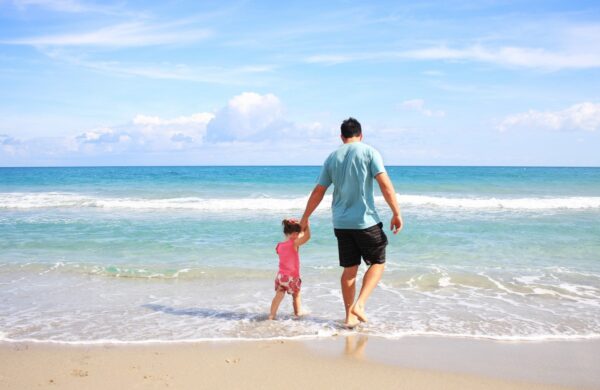Exposure to spaces such as beaches leads to greater value being placed in natural settings, study finds. The research states that childhood days on the beach or messing around in rivers can have significant lasting benefits for our wellbeing in adulthood.
The findings state that exposure to blue spaces – such as coasts, rivers and lakes – as a child made revisiting blue spaces in adulthood more likely, as these adults showed greater familiarity with and placed greater value in natural settings.
More than 15,000 participants in 18 different countries were surveyed for the study, published in the Journal of Environmental Psychology by researchers at the University of Exeter.
“Learning to swim and appreciate the dangers in terms of rip currents, cold temperatures etc is of course primary,” says Mathew White, a senior scientist at the University of Vienna and co-author of the study, “but the message we are trying to get across is that to only teach children about the dangers of water settings may make them overly afraid of, and ill-equipped to benefit from, places that can also be hugely beneficial to their health and wellbeing as they grow up.
“The vast majority of blue space visits both for adults and children do not involve getting wet – so there are also many advantages from spending time near water, not just in it.”
A review published in the International Journal of Hygiene and Environmental Health in 2011 suggested visits to blue space could increase people’s physical activity levels and lower stress and anxiety, while boosting their mood and psychological wellbeing.
Another review published by the Environmental Agency in 2020, found that blue spaces were associated with improvement of mood and feelings of restoration to a greater degree than green spaces.
Researchers at University of Exeter’s European Centre for Environment and Human Health collected data from over 15,000 people in 18 countries in the Blue Health International Survey (BIS).
The survey asked for participants to think back to experiences with blue spaces they had from ages 16 and under, with questions asking for specifics about how often these spaces were visited and how comfortable the parents or guardians were with the kids playing in these blue spaces. The survey also asked respondents to share any experiences with both blue and green spaces over the previous month along with questions about mental health over the two weeks prior to taking the survey.
“In the context of an increasingly technological and industrialized world, it’s important to understand how childhood nature experiences relate to wellbeing in later life,” Valeria Vitale, study lead author and PhD candidate at Sapienza University of Rome said in a statement. “Our findings suggest that building familiarity and confidence in and around blue spaces during childhood may stimulate an inherent joy of nature and encourage people to seek out recreational nature experiences, with beneficial consequences for adult mental health.”
Further information:
- Exeter University news
- Reports in Ecowatch and the Guardian here and here.
- Blue Health survey
- Journal paper in Journal of Environmental Psychology
